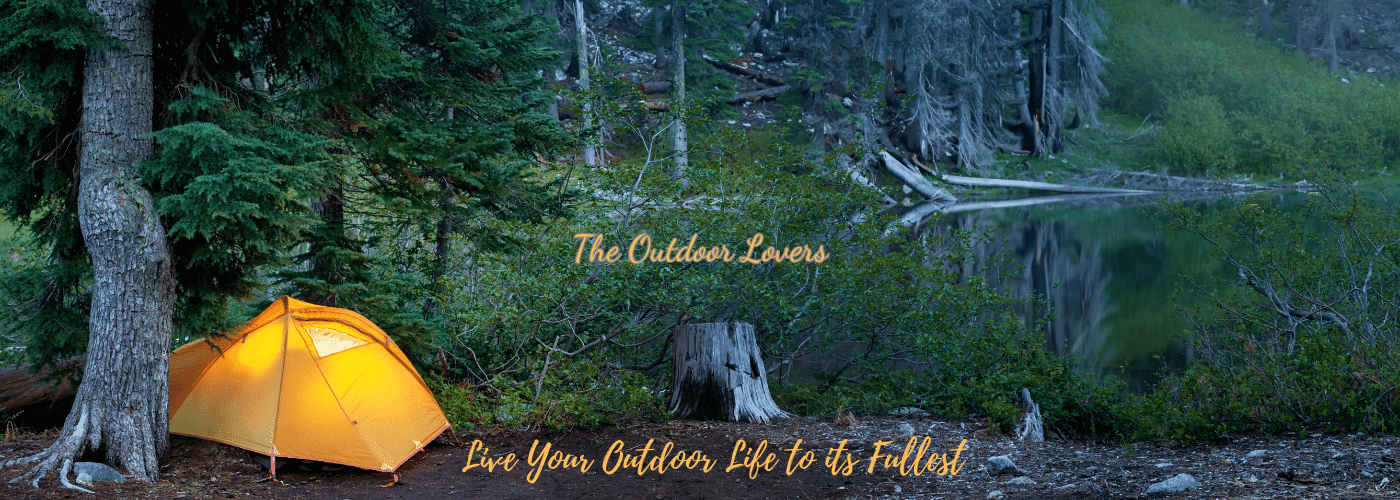The appeal of outdoor experiences has recently captured the hearts of many people, giving them an escape from the limits of urban life and a chance to reconnect with nature.
Two unique but equally intriguing fads have evolved within this domain of exploration: Camping and Glamping. Both experiences allow one to escape everyday life and immerse oneself in the natural world’s magnificence.
However, they provide distinct ways that appeal to various interests and comfort levels. This article will explain what is the differences between Glamping and Camping, focusing on what distinguishes them and assisting you in determining which activity best fits your desires for an outdoor holiday.
The Difference Between Glamping And Camping:
Camping: Getting Back To Basics
At its core, Camping represents the spirit of a classic outdoor experience. It removes the complications of contemporary life and transfers them to a realm of self-sufficiency and a direct connection with nature. This outdoor experience is all about enjoying the rustic appeal that comes with simplicity.
The reliable tent is the foundation of Camping, a symbol of shelter and refuge in the woods. Campers equipped with tents walk into the wide outdoors to construct their temporary abodes, sometimes with little equipment and depending on their creativity.
The process of building a shelter from the ground up not only provides a feeling of success but also creates a better awareness of the natural world.
Camping is more real when you cook. Campers often cook over open flames or on small camp stoves with little equipment and materials. The scent of meals mingles with the fresh air outdoors, generating memories pierced into the center of the camping vacation.
Camping, on the other hand, is defined by its simplicity. Campers are forced to innovate amid the lack of conveniences, leading to deeper connections with nature. This connection may lead to a greater awareness of the natural world’s beauty, inspiring respect and admiration for the elements.
In conclusion, Camping is a voyage into the heart of nature that emphasizes self-sufficiency, ingenuity, and the beauty of life’s basic features. It allows you to get away from the conveniences of modern life and rediscover the raw attraction of the big outdoors.
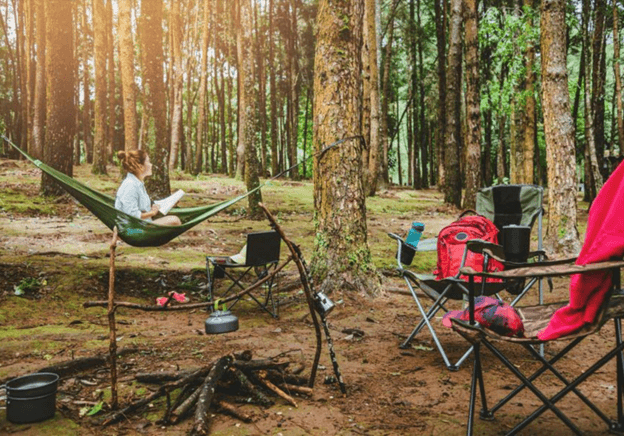
Glamping: Where Glamour Meets Camping
Glamping, a combo of the words “glamour” and “camping,” is an outdoor experience that elegantly combines luxury with the charm of nature. Camping is simple, but Glamping adds comfort and luxury to the wilderness, providing a distinct outdoor lifestyle.
Glamping is defined by prefabricated apartments that go beyond the typical tent. These may include anything from big yurts and comfortable cottages to safari tents that add an element of adventure to the experience. Inside, genuine beds with comfy mattresses and high-quality linens replace sleeping bags on the ground, contrasting with traditional Camping.
Glamping is defined by its modern comforts. Unlike Camping, where visitors are sometimes encouraged to unplug from electronics, glamping huts usually include power, enabling guests to charge their gadgets and have a more seamless connection to the outside world.
This fusion of nature and technology appeals to individuals who want to experience the outdoors while keeping connected to their digital life.
Dining takes on a whole new meaning when you’re Glamping. Gourmet meals made by expert chefs boost outdoor eating to the level of a gourmet journey. The lunchtime experience is elevated to new heights with lavish dining sets packed with tastefully placed tables and seats. Glamping is a feast for the senses, whether you’re eating beneath the stars or in your warm cabin.
The luxurious interior design of the rooms is one of the most appealing parts of Glamping. Carefully selected furnishings blend rustic charm with luxury to create a relaxing atmosphere. Every aspect, from carefully chosen furniture to creative design, adds to a welcoming and visually beautiful ambiance.
In short, Glamping is an appreciation of nature’s beauty without sacrificing modern conveniences. It allows people to immerse themselves in the woods while enjoying the comforts of home. Glamping is a memorable, luxurious outdoor vacation for individuals who want the best of both worlds.
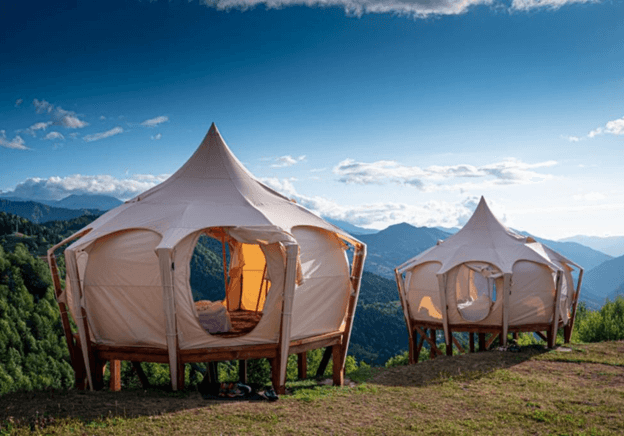
Accommodations And Shelter
Camping Accommodations:
In the camping world, the tent rules supreme as the ultimate shelter. Campers have a wide range of tent choices, varying in size and style.
Traditional dome tents are popular due to their simplicity and ease of setup, but bigger family tents accommodate larger gatherings. Backpackers often choose portable tents that are lightweight and small.
The DIY component of putting up these tents is one of the characteristics of Camping. Campers interact with their environment by choosing an appropriate location, building their tent, and firmly attaching it to the ground.
As campers engage with the area meaningfully, this hands-on approach promotes a stronger connection to the ecosystem. Tents give cover and immerse you in nature, with wind and natural noises.
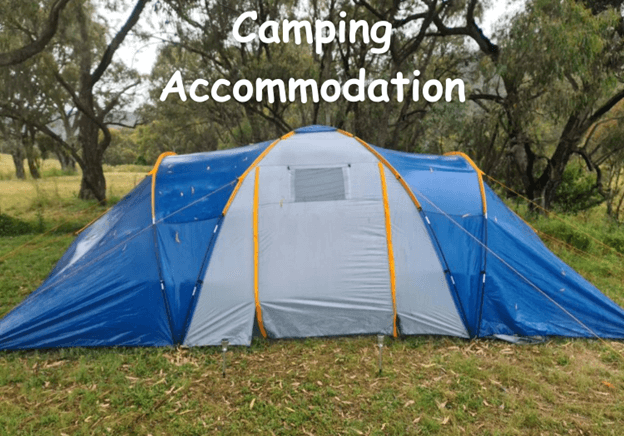
Glamping Accommodations:
Glamping accommodations differ from the traditional DIY tent arrangement associated with Camping. It, on the other hand, provide a variety of unusual choices, such as yurts, cottages, treehouses, and even geodesic domes. These accommodations are pre-built and ready to welcome visitors into a world of luxury and pleasure.
Yurts, modeled after traditional tribal houses, convey an unusual appeal. Cabins combine rustic features with contemporary comforts to create the attraction of a secure escape in the middle of nature. Treehouses take Glamping to new heights, offering a breathtaking outlook and the possibility of cuddling among the branches.
The fact that glamping accommodations are pre-built is one of their particular features. Guests may skip the tent setup procedure and immediately sink into their temporary refuge.
Weary tourists will appreciate the luxury of comfy mattresses, generally equipped with high-quality linens. This comfort enables glampers to concentrate on leisure and discovery rather than the logistical obstacles that Camping often provides.
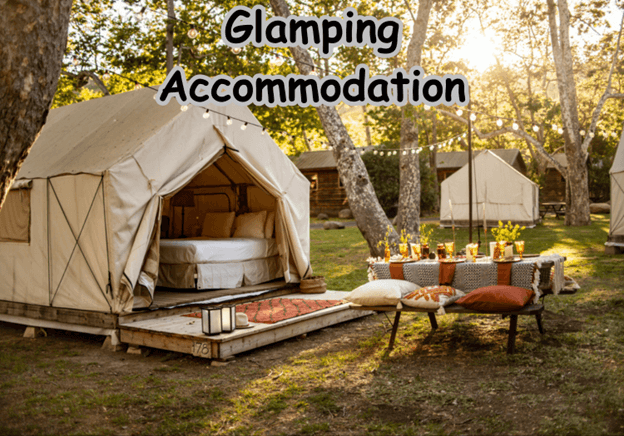
Result:
While both Camping and Glamping celebrate the charm of outdoor life, their approaches to accommodation and shelter are quite distinct. Camping aficionados enjoy pitching tents and becoming closely familiar with their surroundings.
Conversely, Glamping provides a world of pre-built luxury accommodations, enabling visitors to wallow comfortably while admiring nature’s beauty. Whether you like a tent’s simplicity or a yurt’s richness, both choices allow you to get away from it all and enjoy the great outdoors.
Amenities And Facilities
Camping Amenities:
Camping amenities reflect the down-to-earth mindset that supports this outdoor adventure. Campers often depend on common amenities to meet their requirements, such as shared restrooms.
Due to limited access to power, campers are encouraged to live a simple lifestyle, forcing them to manage their resources wisely. Campers cook over open fires or small camp stoves and adjust to life without modern comforts, which develops independence and creativity.
Camping is all about the rustic experience, and the emphasis on minimal facilities highlights this closeness to nature. The lack of private toilets and dependence on natural surroundings for entertainment add to a feeling of wilderness immersion.
Campers find comfort in simplicity, enjoying the challenge of living with fewer amenities while developing a more direct link with nature.
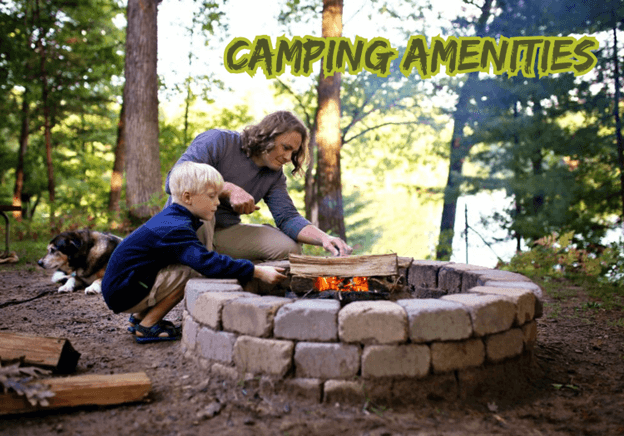
Glamping Amenities:
Glamping offers a unique approach to facilities, emphasizing comfort and convenience without sacrificing nature’s beauty. Private bathrooms with hot water provide a touch of luxury, enabling glampers to refresh in style.
Access to power, heating, and cooling creates a comfortable atmosphere regardless of the weather, allowing visitors to experience a climate-controlled room in the middle of the wilderness.
Aside from the necessities, many glamping locations include a variety of recreational amenities. Hot tubs, swimming pools, and spa services improve the experience by offering relaxation and leisure in an environment that perfectly merges nature with enjoyment. These amenities appeal to individuals who want to be pampered while on vacation.
A distinguishing element of glamping amenities is the focus on convenience and comfort. Unlike Camping, where accepting simplicity is essential, Glamping offers a refuge for visitors to rest and recover without preceding modern amenities.
The combination of luxury amenities and natural beauty provides an alluring conflict that appeals to people looking for leisure in a scenic location.

Result:
The differences in amenities and services between Camping and Glamping appeal to different tastes. Camping values self-sufficiency and rustic appeal, depending on shared resources and immersing campers in the spirit of nature.
Conversely, Glamping attempts to blend luxury with nature by providing private comforts and various amenities to create a luxurious outdoor experience. Whether you like the simplicity of Camping or the lavish lifestyle of Glamping, both choices provide an opportunity to retreat, relax, and reconnect with nature.
Cooking And Dining
Camping Cooking:
Using outdoor techniques and a reliance on one’s resources, camping cooking is an experience in and of itself. Campers often make meals using traditional outdoor cooking techniques such as campfires and portable stoves. These techniques need expertise and ingenuity, as campers collect firewood, make fires, and regulate heat levels to prepare tasty meals.
Meals served while Camping is often simple and created using simple items. Campers cook with minimum utensils and equipment, relishing the challenge of preparing good meals with little resources. Campers are free to try new things in the kitchen, learn new skills, and explore new tastes due to this setting’s promotion of innovation.

Glamping Dining:
Glamping elevates eating by providing pre-prepared meals or the services of on-site chefs. This means that glampers may enjoy wonderful meals without having to prepare them themselves. This dining experience is defined by comfort and luxury, enabling visitors to concentrate on relaxation and pleasure.
Glamping is known for its elaborate dinner settings. Outdoor dinners are transformed into luxurious celebrations with the addition of tables, chairs, and beautiful crockery. Guests may dine in luxury, surrounded by nature’s splendor and the comfort of lovely lodgings. Beyond the cuisine, the attention to detail creates a sensory dining experience.

Result:
Camping cooking focuses on the art of outdoor food creation, requiring campers to learn how to cook over open fires or portable stoves. The emphasis is on simplicity and resourcefulness as campers prepare meals using simple materials and equipment.
Glamping dining, on the other hand, provides a greater degree of convenience and pleasure, with pre-prepared gourmet meals and complex buffets catering to a sophisticated taste. Campfire cooking and Glamping provide new ways to enjoy cuisine in nature.
Cost Considerations
Camping Costs:
Camping is often promoted as a low-cost outdoor pastime. It is often less expensive than other modes of transportation and lodging. However, purchasing camping equipment such as tents, sleeping bags, and cooking equipment requires an initial cost. While this initial cost may appear high, this equipment may be utilized for several trips, lowering the cost of each trip.
Self-preparation of meals is one way that Camping reduces expenses. Campers can bring their own supplies and cooking equipment and prepare meals over campfires or portable stoves. This do-it-yourself method saves money on meals and adds to the true camping experience.
Glamping Costs:
Glamping generally has a higher upfront fee because of the Glamping accommodation and all-inclusive price. The yurts, cottages, and other unusual lodgings are more expensive and have more facilities. This investment, however, allows access to a high degree of comfort and convenience.
Glamping experiences often involve an all-inclusive price, including lodging, food, and numerous activities. This reduces the need to be concerned about specific charges, resulting in a smooth and trouble-free experience. Glamping packages may be similar to lavish hotels, providing a place to stay, personalized activities, and plentiful amenities.
Result:
Camping is less expensive in the long term, with the initial expenditure on gear made up by the opportunity to self-prepare meals. Conversely, Glamping has a greater upfront cost owing to the lavish lodgings and extensive packages that include many parts of the stay. Camping for its affordability or glamping for its luxury allows escaping and reconnecting with nature.
Experience And Atmosphere
Camping Experience:
The camping experience is based on overcoming obstacles and developing a strong connection with nature. Every aspect of Camping, from pitching a tent to preparing food over an open fire, requires some work and expertise. As campers dominate obstacles and learn to manage the natural world, this hands-on approach promotes a feeling of success.
Camping provides an exceptional chance for personal engagement with nature. The lack of modern conveniences enables campers to immerse themselves in their environment thoroughly. The lack of frills and the need for independence and ingenuity make for a formative experience. Camping allows you to flee from the digital world and uncover peace in the natural world.

Glamping Experience:
Glamping, on the other hand, offers a more relaxed and luxurious atmosphere. It appeals to individuals who want to be comfortable without losing touch with nature. Glamping accommodations are meant to wrap visitors in luxury, providing the ideal balance of splendor and natural beauty.
Glamping is great for those wishing to experience nature while enjoying modern amenities. Guests may relax in luxuriously built lodgings, which frequently include private baths, electricity, and comfortable mattresses. Combining natural beauty and human comforts produces a pleasant atmosphere that promotes rest and regeneration.
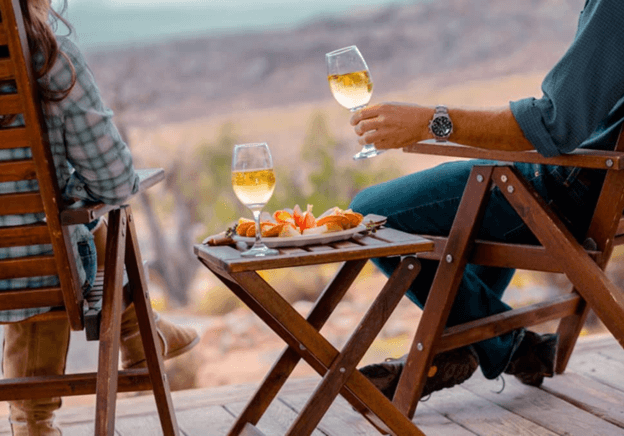
Result:
The camping experience improves with difficulty and a closer connection to nature. It promotes simplicity, self-sufficiency, and disconnecting from the digital world.
Conversely, Glamping offers a more relaxed and luxurious ambiance, appealing to individuals who want comfort without sacrificing their connection to the great outdoors.
Whether you like camping for its rustic appeal or glamping for its beautiful combination of luxury and nature, both choices provide unique ways to enjoy the world around us.
Who Should Choose Which?
Camping is an excellent option for nature lovers who want to submerge themselves in the raw, immersive outdoor experience. Individuals who like disconnecting from modern comforts and immersing themselves in their environment may find camping a rewarding experience.
Those who appreciate improving their outdoor skills, from pitching tents to cooking over open flames, will enjoy the trials of Camping. This option is ideal for campers who value independence and want to connect with nature more deeply.
Glamping appeals to those who want to be comfortable and luxurious while enjoying nature’s beauty. It’s a wonderful alternative for couples looking for a romantic break that blends relaxation with nature.
Families and parties searching for a one-of-a-kind bonding experience will appreciate the ease of pre-built lodgings and all-inclusive facilities. Glamping provides a happy medium between lavishness and the natural outdoors, appealing to those seeking a peaceful retreat without sacrificing comfort.
Finally, the decision between Camping and glamping is influenced by personal tastes and desired experience. Camping is for people who want a back-to-basic experience and are prepared to take on challenges, while glamping is for those who want to relax in luxury while enjoying nature.
Both Camping and Glamping provide exciting and novel opportunities to interact with nature while satisfying the desires of comfort-seekers, adventurers, romantics, and groups of friends and family.
Additional Resources
If you are looking for more tutorials, walkthroughs and troubleshooting about camping and enjoying the outdoors, here are some additional posts to check out:
Conclusion:
Glamping and Camping are separate means of interacting with nature in outdoor retreats. Glamping extends a lavish hand, providing the luxury of rich lodgings and polished amenities while surrounded by the peaceful embrace of the wild.
On the other hand, Camping is attractive with its rustic authenticity, inviting people to pitch tents, make campfires, and establish bonds with nature in its purest form.
Glamping and camping are based on personal preferences and the intended experience. Is cooking over an open flame and sleeping under canvas more appealing than eating magnificent dinners beneath starlit skies?
Both methods eventually lead to the same place: a closer connection with nature whether you want to combine modern luxuries with natural beauty or experience self-sufficiency, a break from every day, a chance to revive the soul, and a chance to rediscover nature.
Thanks for reading, If you think I forgot something or if you simply want to share a story or some advice, feel free to leave your comment below. Thanks, be safe and have fun.!
